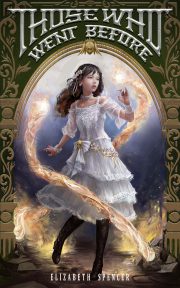What Does Slavic Fantasy Even Mean?
by Jelena Dunato
When my publisher prepared the marketing strategy for my upcoming novel Dark Woods, Deep Water, one of the obvious labels proposed besides “fantasy” and “dark” was “Slavic.” It’s clear why—I’m Croatian; I’ve written a book featuring Morana, the Slavic Goddess of Death. And yet, this label caused me intense discomfort. It took me a fair amount of soul-searching to understand why.
The problem, I believe, has two angles and deals with the “Slavic” label from the inside looking out and from the outside looking in.
The Inside Angle
I sometimes worry what Croatian readers will think about my book, considering that Croatian mythology has no set canon, no written sources, and very few artifacts connected with the religious beliefs of our ancestors. Croats converted to Christianity before creating any written documents. The first traces of our presence on the Eastern Adriatic coast are all connected with Christianity: little churches with specific ornamentation, stone tablets with Glagolitic script developed to spread the Christian faith. Our history is inexorably connected with Christianity.
To complicate matters, our small nation was divided among great empires for centuries—Byzantium, the Habsburgs, the Ottomans, Venice—creating a melting pot of cultures, languages, and religions, where Slavic identity is just one of many. The island where I live now was Venetian territory for almost five hundred years. When I look around, there are no traces of Slavic heritage—it’s all Venice.
I was born in Yugoslavia, a country that doesn’t exist anymore because it tore itself apart in several bloody wars in the 1990s. Children in socialist regimes didn’t learn about religion or mythology, seen as anachronistic hocus-pocus. I grew up in an industrial city, out of touch with the traditions or ways of my ancestors. My only connection with the world of the ancient Slavs was one little book of fairy tales, Priče iz davnine (Croatian Tales of Long Ago) by Ivana Brlić-Mažuranić, which every child in Croatia reads.
When I tried to figure out what I was—as a grown-up writer—I was at a loss. My mother tongue is undoubtedly Slavic, as is my name. My cultural identity, though, is more complex since it has soaked up all the mixed influences of my heritage. Faced with the publishing industry’s demand to give myself an easily understandable label, I went with Slavic because it was the most honest—if not completely accurate—choice.
I wrote a Slavic-inspired, secondary-world fantasy. I used Slavic deities precisely because they are vague, leaving enough space for my imagination. Their portraits are the products of my fragmentary mythological education. Same for the history in my novel. My imaginary kingdom is based on the history of many different peoples crammed on a small piece of land, with a powerful empire breathing down their necks and memories of a recent war still traumatizing them. If anything, this fictional landscape is the reflection of all the arbitrary elements that influenced one girl growing up in Eastern Europe at the end of the twentieth century.
I’m absolutely terrified that someone will see my book—a dark, secondary-world fantasy, loosely inspired by the mythology and history of the Eastern Adriatic—as the representation of—anything, really: Slavic mythology and folklore, Croatian history, Croatian fantasy in general. I’m just one humble writer, and I speak for no one but myself.
The Outside Angle
In the US/UK publishing, “Slavic” is a popular label for fantasy novels. There are wonderful examples other Slavic-inspired books use for comps, such as Katherine Arden and Naomi Novik—and then there are some ill-researched, deeply problematic stories that make every Slavic writer cringe. What they have in common, however, is a certain landscape: the vast snowy forests and steppes of Northeastern Europe. Also, a smattering of mythological creatures, like rusalke, štrige, or Baba Yaga. Furs, winter, wild men on horses, remote villages, unpronounceable names. I generalize wildly, but there does seem to be a list of things that English-speaking readers expect from a Slavic book.
I understand that marketing labels can’t be nuanced, and I wouldn’t worry about this generalization if it weren’t for the publishing industry’s habit of limiting the number of diverse books. If the majority of already-published books inspired by Slavic culture(s) feature the same type of worlds, then the industry will decide that all the slots have been filled, and there’s no need to publish more of the same. Books written by non-Slavic writers via cultural appropriation leave no room for actual Slavic voices. No matter that “Slavic” includes dozens of nations and languages, millions of people, and thousands of authors writing about different cultures and histories.
Every foreigner writing in English faces this problem sooner or later. We—the diverse, the exotic, the alien—are expected to write stories rooted in our cultures. I can’t publish a book about life in New York because it won’t be authentic. But bookshelves are already stacked with badly researched stories about other cultures written by Anglo-American writers, and endorsed by the industry. When writers from those cultures knock on publishers’ doors with their stories, they learn that the market is oversaturated. Just ask Greek writers what they think about Greek myth retellings.
And when a foreign writer manages to publish their unique story, it will immediately be perceived as the representation of the whole culture. The author will become an unwilling ambassador, speaking for millions of people and hundreds of years of history.
I don’t speak for anyone but myself, and that’s all I can offer to my English-speaking readers as well as my compatriots. This is me, a vaguely Slavic person from a small country burdened with a large history, and this is my story, grown in my heart, shaped by everything that shaped me. Call it Slavic, if you must, but remember that, to achieve true diversity, publishing must accept us as it accepts Anglo-American authors. We’re not colorful ornaments or sweeping generalizations. We’re authors who want to be judged on our own merit.
 Jelena Dunato is an art historian, curator, writer and lover of all things ancient. She grew up in Croatia on a steady diet of adventure novels and then wandered the world for a decade, building a career in the arts.
Jelena Dunato is an art historian, curator, writer and lover of all things ancient. She grew up in Croatia on a steady diet of adventure novels and then wandered the world for a decade, building a career in the arts.
Jelena’s stories have been published in BCS, The Dark and Future SF, among others. She is a member of SFWA and Codex.
Her debut novel, Dark Woods, Deep Water will be published by Ghost Orchid Press in September 2023.
Jelena lives on an island in the Adriatic with her family. You can find her at jelenadunato.com and on Twitter @jelenawrites.


